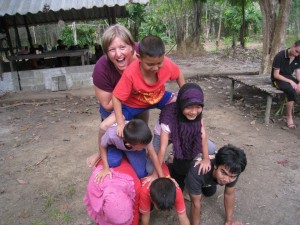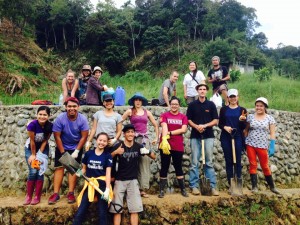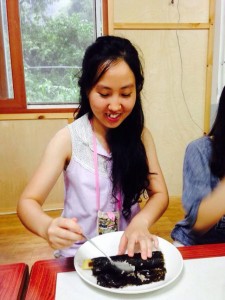My name is Thibaut alias Phu Pha, my Thai name. I’m French and I’m 20 years old. I’m studying engineering and after the 3rd year we have the opportunity to realize a personal project, the only “rule” is to open is mind and discover a culture different of ours. I wanted to be volunteer during this period because it was important for me to be useful and meet people from all around the world. The environment is for me really important so that I wanted to find a project which permits me to work outside close to the nature. I found this project in Kok Riang proposed by Dalaa association and decided to join the project to learn about gardening, bio agriculture and of course Thai culture.
I have been living in Kok Riang (Near to Hat Yai, south Thailand) for 3 months with Lung Jaeng the host, Panoi his wife, Yai his mother, Can his son and many other people who visited. Since the beginning I felt really comfortable because Thai people seems always happy, are always smiling, and Lung Jaeng family like to live with volunteers and share almost everything.
During these 3 months I learned a lot about:
Living in a community
That means living with Lung Jaeng’s family, his friends, Dalaa members, other volunteers but also with people we don’t even know. For example we are joining all the events or ceremony at Kok Riang temple and we served people, wash the dishes and try to involve people in the project explaining what we are doing in Thailand and proposing people to visit us.
We are also organizing some activities with kids, we went to the school worked on their garden but teachers wasn’t involved and not so much children join to work in the garden. That’s why we plan to organize more in the future. Some children went fro a Week end at home and it was really nice to play games and talk about Gardening and chemical and non chemical agriculture.
Almost every day some friend are visiting and sometimes working with us. It’s interesting because they are happy to share their knowledge.
And that’s because of all these people I learned so much about gardening and construction.
Gardening and construction
There are three different places where we are working in Kok Riang: the house with the garden, the second garden where we grew vegetables and fruit trees and the place where Lung Jeang is growing the rice (but I didn’t work a lot in the last one).
At home we are cleaning the garden so that everything is growing better and we can also plant some vegetables. And the other tasks are just about living together, cleaning, cooking …
At the second garden we grew vegetables, planted new trees and took care of everything by watering every day.
Then with a 2 weeks work camp we begin to build new toilet. It was interesting because they are doing everything alone and with methods totally different from European.
Thai culture
It is a peaceful and relaxing way of life where people are not creating useful problems. At the beginning it was difficult because I needed to change all my habits and almost to ‘forget’ my European way of life. But then after few weeks, I just enjoy every day without planning anything. It was always different, full of surprises and beautiful meeting.
It was for me a beautiful experience and will never forget it. But to understand what really happen here you need to come and live your experience.
So come and enjoy the AMAZING KOK RIANG.
Phu Pha



